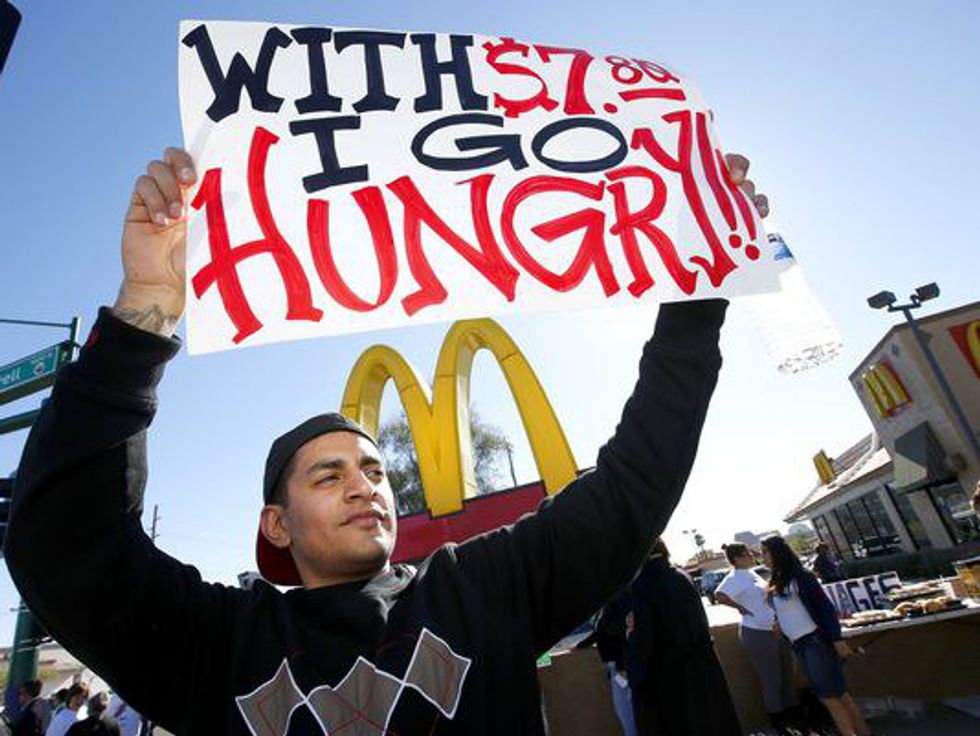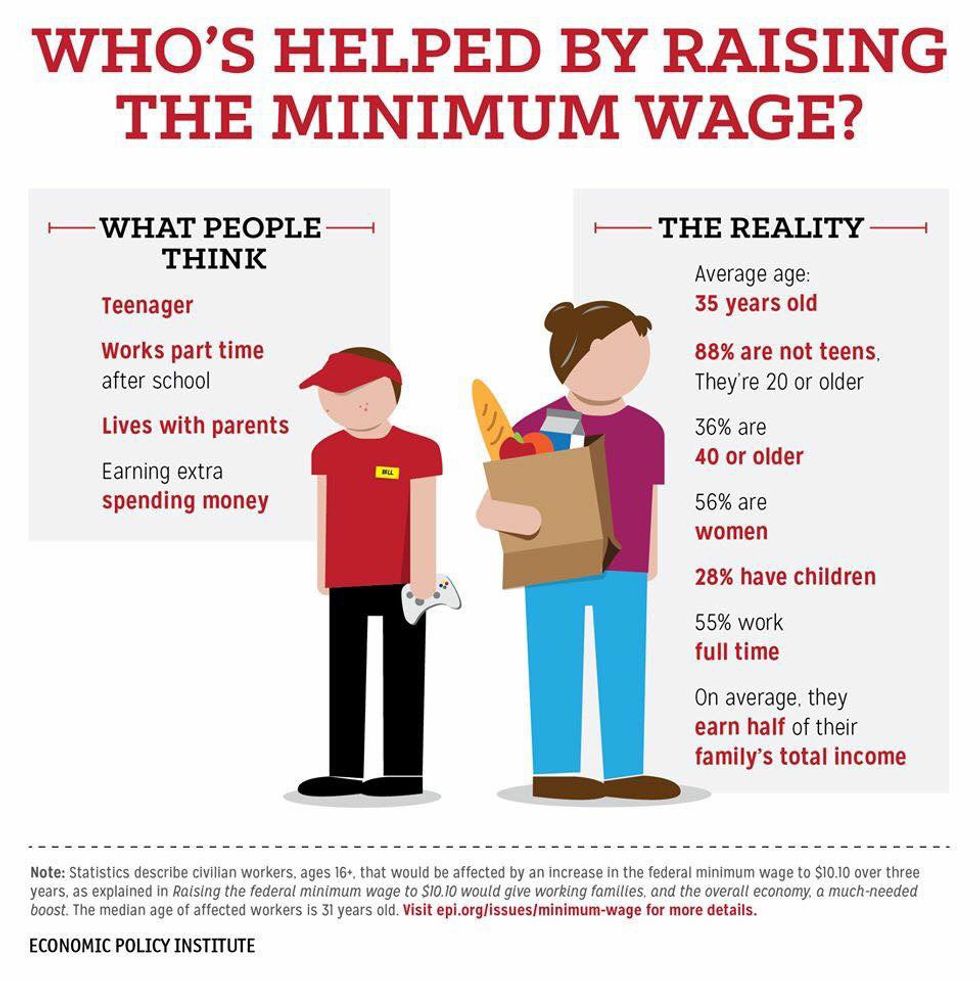Raising the minimum wage to a livable wage would not only benefit workers and their families, it would also have positive impacts on the economy and society. Studies have shown that by increasing the minimum wage, poverty and inequality can be reduced by enabling workers to meet their basic needs and reducing income disparities.
I come from a low-income family. A family, like many others in the United States, which has lived paycheck to paycheck. My family and other families in my community have been trying to make ends meet by living on the minimum wage. We are proof that it doesn't work.
The federal minimum wage is $7.25 an hour, and the average worker works 40 hours a week. That's $290 a week (not counting sick days and taxes). Multiply $290 by the 52 weeks in a year, and the gross yearly income for a minimum wage worker is $15,080. In 2010, the poverty line threshold was a minimum income of $22,314 for the average nuclear family. See where the problem starts?
What about combined income from two minimum-wage workers? Wouldn't that put them above the poverty line? In a nuclear family with two working parents and two children, their combined yearly wage would be about $30,160. That's only $7,846 above the poverty line. Now, let's take into account rent, food, gas, utilities, car insurance, health insurance, school supplies, clothes, and tuition. Try and see how $30,160 would cover all those expenses in a year – it doesn't. The minimum wage is not a living wage.
Here are some myths that I would like to present and debunk:
Raising the minimum wage will kill jobs. This is false. In a March 2011 report, the Center for Economic and Policy Research concluded that raising the minimum wage would not only help workers but actually have the possibility of increasing job openings. Better pay leads people to spend more money, and the cycle repeats.
"Nobody living in one of the most influential nations in the world should be worried about making ends meet."
On June 2, 2014 , Seattle changed the city's minimum wage to $15 dollars. Following that procedure, unemployment decreased 17.46 percent – falling from a previous 6.3 percent to 5.2 percent.
Raising the minimum wage will hurt small business. Not only has a higher minimum wage worked in cities across the United States, but a 2006 study by the Center for American Progress and Policy Matters compared small business performances and found that the small businesses who paid the higher wages were more profitable.
Mostly teenagers work minimum-wage jobs. Again, this is false. Half of minimum-wage workers are 25 years old or older. Most minimum-wage workers support their family on this income – and 28 percent of these individuals have children.
The minimum wage is not sufficient to uphold and support an individual, especially individuals with families. I've often heard: "It isn't fair that someone working in a fast food restaurant will get paid the same as a college professional!" If we raise the minimum wage to, let’s say, $11 an hour, it would still be a lower amount than that of a college professional. Even so, someone not having a college degree doesn't make their worth any less valuable. Nobody deserves to live in poverty. Nobody living in one of the most influential nations in the world should be worried about making ends meet. We are a nation of equality and opportunity – it's time to let some of that opportunity flow.
What is the current minimum wage at the federal level?
Federal minimum wage is currently $7.25 per hour. Many states also have minimum wage laws, and the employee is entitled to the higher of the two minimum wages. (U.S. Dept. of Labor)
What are the benefits of raising the minimum wage?
A higher minimum wage means less workers living below the poverty line, more workers being able to make ends meet and potentially spend beyond that, and workers would be more productive upon the increase.
What are the states that have set a $15/hour minimum wage?
California is at $15.50 per hour, Washington is at $15.74, and Massachusetts is at $15. These are the only states to have a $15 minimum wage as of Jan. 1, 2023. (The Economic Policy Institute Tracker)









 Going to the cinema alone is good for your mental health, says science
Going to the cinema alone is good for your mental health, says science












 women in street dancing
Photo by
women in street dancing
Photo by  man and woman standing in front of louver door
Photo by
man and woman standing in front of louver door
Photo by  man in black t-shirt holding coca cola bottle
Photo by
man in black t-shirt holding coca cola bottle
Photo by  red and white coca cola signage
Photo by
red and white coca cola signage
Photo by  man holding luggage photo
Photo by
man holding luggage photo
Photo by  topless boy in blue denim jeans riding red bicycle during daytime
Photo by
topless boy in blue denim jeans riding red bicycle during daytime
Photo by  trust spelled with wooden letter blocks on a table
Photo by
trust spelled with wooden letter blocks on a table
Photo by  Everyone is Welcome signage
Photo by
Everyone is Welcome signage
Photo by  man with cap and background with red and pink wall l
Photo by
man with cap and background with red and pink wall l
Photo by  difficult roads lead to beautiful destinations desk decor
Photo by
difficult roads lead to beautiful destinations desk decor
Photo by  photography of woman pointing her finger near an man
Photo by
photography of woman pointing her finger near an man
Photo by  closeup photography of woman smiling
Photo by
closeup photography of woman smiling
Photo by  a man doing a trick on a skateboard
Photo by
a man doing a trick on a skateboard
Photo by  two men
two men  running man on bridge
Photo by
running man on bridge
Photo by  orange white and black bag
Photo by
orange white and black bag
Photo by  girl sitting on gray rocks
Photo by
girl sitting on gray rocks
Photo by  assorted-color painted wall with painting materials
Photo by
assorted-color painted wall with painting materials
Photo by  three women sitting on brown wooden bench
Photo by
three women sitting on brown wooden bench
Photo by 
 Photo by
Photo by  Photo by
Photo by  Photo by
Photo by  Photo by
Photo by 


 people sitting on chair in front of computer
people sitting on chair in front of computer











